| Srl | Item |
| 1 |
ID:
110149
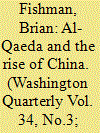

|
|
|
| 2 |
ID:
122490
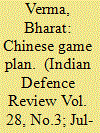

|
|
|
|
|
| Publication |
2013.
|
| Summary/Abstract |
With the opening of two fronts against New Delhi, Beijing will, in collusion with Islamabad, repeat '1962' in the near future on an enlarged scale.
As a tactical ploy for the past several years, Beijing and Islamabad have been dishing out sermons on friendship. China has used its lobby successfully in India to promote the concept that the two nations, instead of being at loggerheads with each other, should join hands to make the twenty-first century theirs.
|
|
|
|
|
|
|
|
|
|
|
|
|
|
|
|
| 3 |
ID:
090676
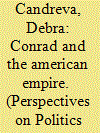

|
|
|
|
|
| Publication |
2009.
|
| Summary/Abstract |
Joseph Conrad offers some of the most notoriously contested writing on imperialism in nineteenth-century literature. In this article, I use two of his stories ("An Outpost of Progress" and Heart of Darkness) to argue that his critique of imperialism is as relevant today as it was in his own time.
Conrad's critique of imperialism is twofold. First and most simply, he condemns it as an economically exploitative endeavor. Second, and more importantly, he rejects the "idealistic" claim often invoked to justify imperialism as the bearer of progress, enlightenment, and other supposedly universal liberal values. This second critique causes Conrad the most difficulty, largely because his rejection of idealism is only partial. I argue that the most controversial aspects of his work are manifestations of a philosophical struggle between universalistic idealism on the one hand, and relativistic skepticism on the other. In this, Conrad contends with a problem that historically has challenged both liberalism and its conservative critics alike. Moreover, it continues to challenge both perspectives today, particularly in the debate over so-called American imperialism.
|
|
|
|
|
|
|
|
|
|
|
|
|
|
|
|
| 4 |
ID:
100517
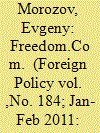

|
|
|
| 5 |
ID:
159799
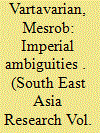

|
|
|
|
|
| Summary/Abstract |
This article examines relations between American imperial personnel and indigenous Muslims in the southern Philippines from the colonial advent to the post-colonial present. American officials initially established imperial linkages with Muslims that bypassed emerging political arrangements in core Christian areas. In ruling different Filipinos disparately, Christian and non-Christian zones of the archipelago assumed separate developmental trajectories. Muslims were racialized and forcibly modernized, but stood apart as a peripheral minority. Although sub-national imperial connections were severed after 1913, Muslims retained a memory of a distinct relationship with the United States that benefited local interests and contained government violence when the Americans returned to fight a war on terror at the beginning of the 21st century.
|
|
|
|
|
|
|
|
|
|
|
|
|
|
|
|
| 6 |
ID:
032338
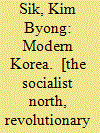

|
|
|
|
|
| Publication |
New York, International Publishers Co Inc, 1970.
|
| Description |
319p.hbk
|
| Standard Number |
717802914
|
|
|
|
|
|
|
|
|
|
|
|
Copies: C:1/I:0,R:0,Q:0
Circulation
| Accession# | Call# | Current Location | Status | Policy | Location |
| 005905 | 951.9/SIK 005905 | Main | On Shelf | General | |
|
|
|
|
| 7 |
ID:
115082
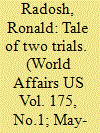

|
|
|
|
|
| Publication |
2012.
|
| Summary/Abstract |
This year, the sixtieth anniversaries of two important trials will take place. The likelihood is that they will be scarcely noticed, although in their day these trials were monumentally important examples of the all-out propaganda offensive the USSR would wage during the coming years of the Cold War. Even now, these trials provide a unique window onto the way in which the Communist propaganda machine worked, denying and in effect erasing Soviet brutalities at the same time that it was projecting exactly the crimes Stalin had committed-in this case, a summary judicial execution based in large part on rank anti-Semitism-onto the American political and legal system.
|
|
|
|
|
|
|
|
|
|
|
|
|
|
|
|
| 8 |
ID:
163346
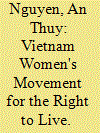

|
|
|
|
|
| Summary/Abstract |
This article examines the political and diplomatic struggles in urban South Vietnam from the perspective of women in the Vietnamese Women’s Movement for the Right to Live (WRL) during the Vietnam War. This movement was a timely response to the American war of aggression, which had destroyed the fabric of South Vietnamese society and drastically diminished women’s position within it by 1970. Under the leadership of Mrs. Ngô Bá Thành, the WRL fought for peace and women’s liberation through political action and shrewd diplomacy. Unlike female guerrilla fighters, the WRL maintained political autonomy and neutrality throughout the conflict. As a result, it was violently repressed by the Saigon government and quickly disbanded after the communist victory in 1975. Nevertheless, studying these politically sophisticated women’s anti-war efforts is crucial to understanding the symbiotic yet destructive relationship between Third World women and American imperialism during the twentieth century. It also helps dismantle essentialist assumptions about Asian women as inherently submissive and politically naïve. The WRL is a sterling example of Vietnamese women’s ingenuity in their dual struggle for national liberation and gender equality.
|
|
|
|
|
|
|
|
|
|
|
|
|
|
|
|